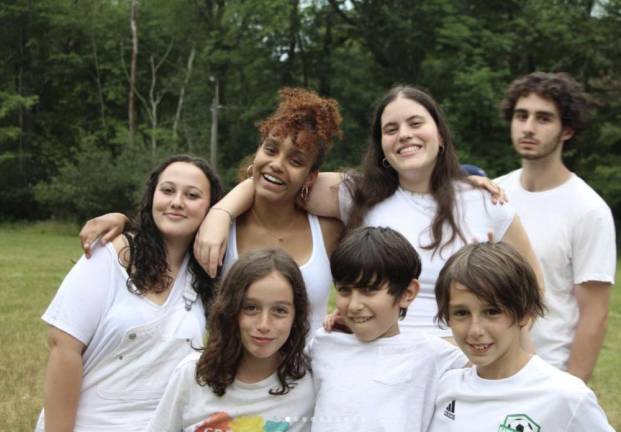Jewish Summer Camps Are Tried and True, Even if Not as Rustic as They Once Were
For parents looking for a Jewish connection to send their kids to this summer, there are some very good options.

Jews and summer camp go together like bagels and lox, like bialys and onions; like getting Chinese food on Christmas. Think Alvy Singer (Woody Allen) spritzing on “socialist summer camps” to Allison (Carol Kane) in Annie Hall. Think books, maybe even a shelf full (depends how big your shelf is), all about the subject, including, most recently, Sandra Fox’s brilliant “The Jews of Summer: Summer Camp and Jewish Culture in Postwar America,” published by Stanford University Press in February 2023.
On the off chance you thought Jewish summer camps were just tremendous fun—which they are—and a chance for harried parents to get something like a slight summer break—debatable—Fox, who Visiting Assistant Professor and Director of the Archive of the American Jewish Left in the Digital Age at NYU, Fox has some fascinating news for you. It’s not just old news either. Broadly speaking, many of the same forces and ideals which compelled the Jewish summer camp movement still exist today, and here are some places your kids learn them.
Camp Kinder Ring (www.campkr.com), founded in 1927 by the Workmen’s Circle (Der Abreter Ring in Yiddish; and today known as the Worker’s Circle) is among the best-known survivors of the Socialist worker-based summer camps. Located in Hopewell Junction in the Catskills (Dutchess County), Camp Kinder Ring is sited on one-hundred beautiful acres on Sylvan Lake. Its self-described mission is of “a nurturing Jewish community where our progressive goal of ‘making the world a better place for all’ is introduced to our campers in a fun, safe, and joy-filled environment.”
(In September 2023, it was announced that, after 96 years together, the Workers Circle and Camp Kinder Ring had separated, with the Camp going forward as an independent non-profit operation.)
Camp Kinder Ring kids range in age from 3rd to 11th grade and is accredited by the American Camp Association. Among its facilities are lit tennis courts; an Olympic-sized heated swimming pool; indoor and outdoor basketball courts; a lit hockey rink; a movie theater; ropes courses; a climbing wall and all manner of fields. Rowboats, sailboats, canoes, kayaks and paddle boards make the camp’s figurative navy.
While Kinder Rings rates are rather distant from its tenements roots, grants are available to first time campers through the Foundation for Jewish Camps One Happy Camper Program.
Camp Kinderland (www.campkinderland.org), founded in 1923, is another child of the Workmen’s Circle, and one that still visibly reflects its radical labor-inspired roots. Located in Tolland, Massachusetts, it’s slogan is “Summer Camp With A Conscience,” which is shorthand for saying it offers the usual range of summer activities in a context of both Yiddish and Jewish secular history, the including an active interest in multi-culturalism and progressive social causes.
Campers can start Kinderland at age 9 and continue to ages 15 and 16, as Counselors-in-Training.
Partial need based scholarships are available.
Camp Shomria (campshomria.com), founded in 1923, represents another Jewish summer camp tradition, that of Hashomer Hatzair, a progressive Zionist youth movement originally founded in Europe. Open to campers ages 7 to 16, Shomria’s slogan, “A Kibbutz in the Catskills”—in the town of Liberty, to be precise— gives a strong indication of their values which include environmentalism, farming and participatory democracy.
Reflecting their historical values, scholarships and financial aid are available.
For Manhattanites seeking a Jewish day camp option, the famed 92nd Street Y (founded in 1874 as the Young Men’s Hebrew Association) offers a wide variety of programs catering ranging from pre-to high schoolers. kids from pre-to high school. See www.92ny.org/camps/summer-programs for details.